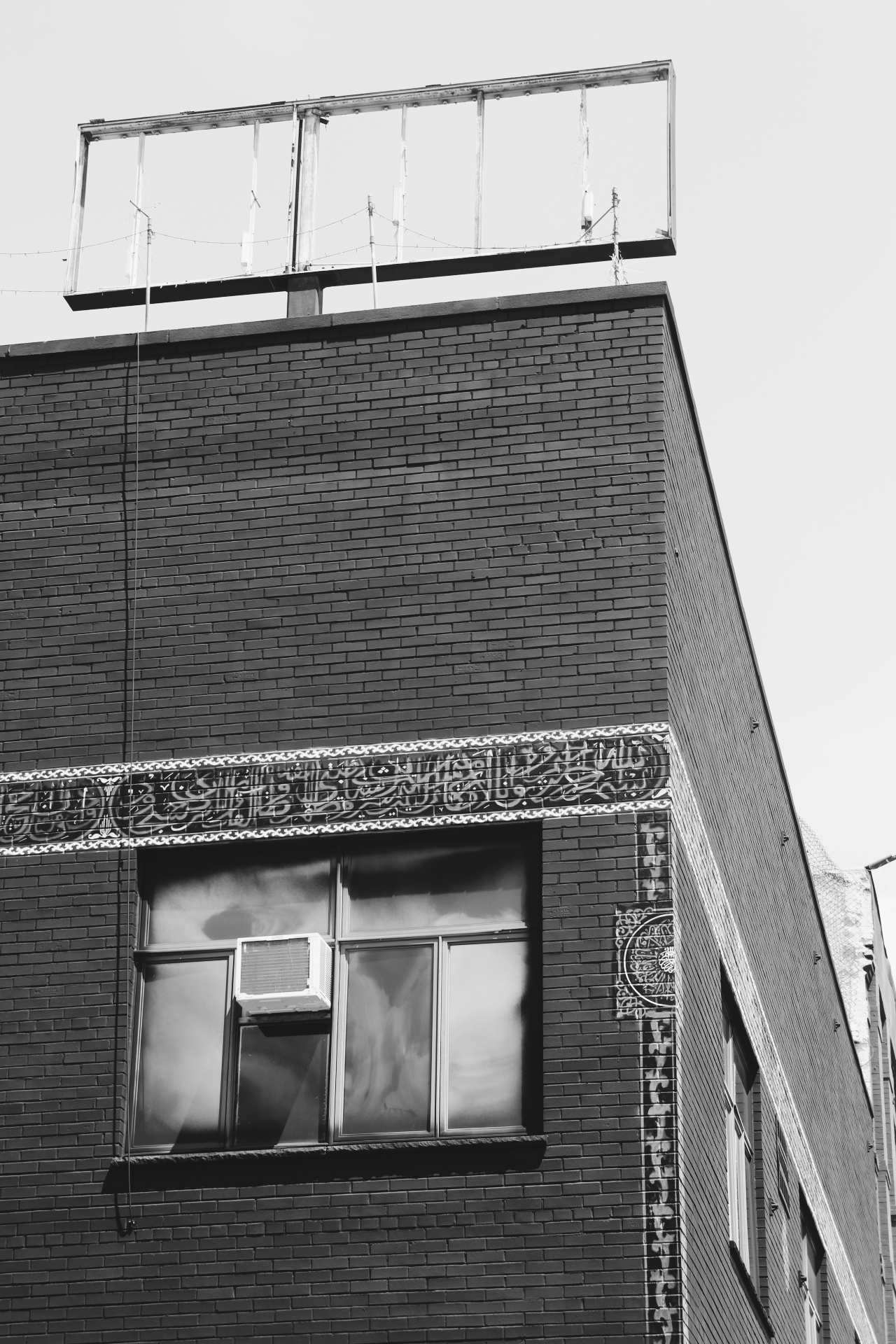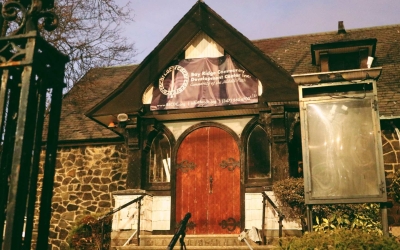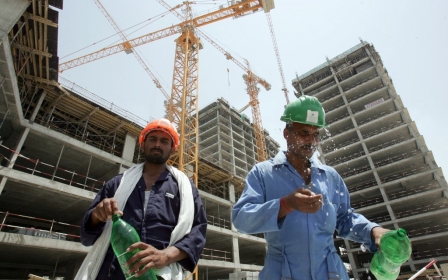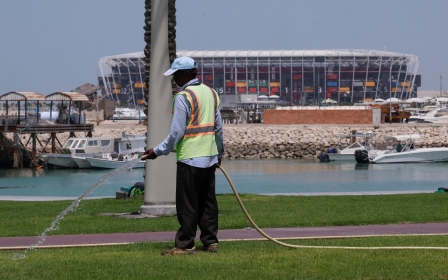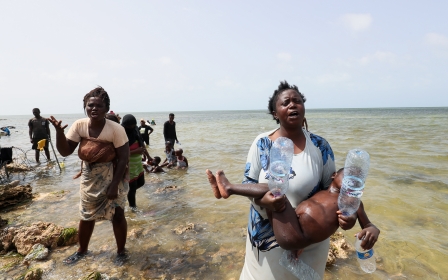A New York mosque becomes a sanctuary for neglected migrants
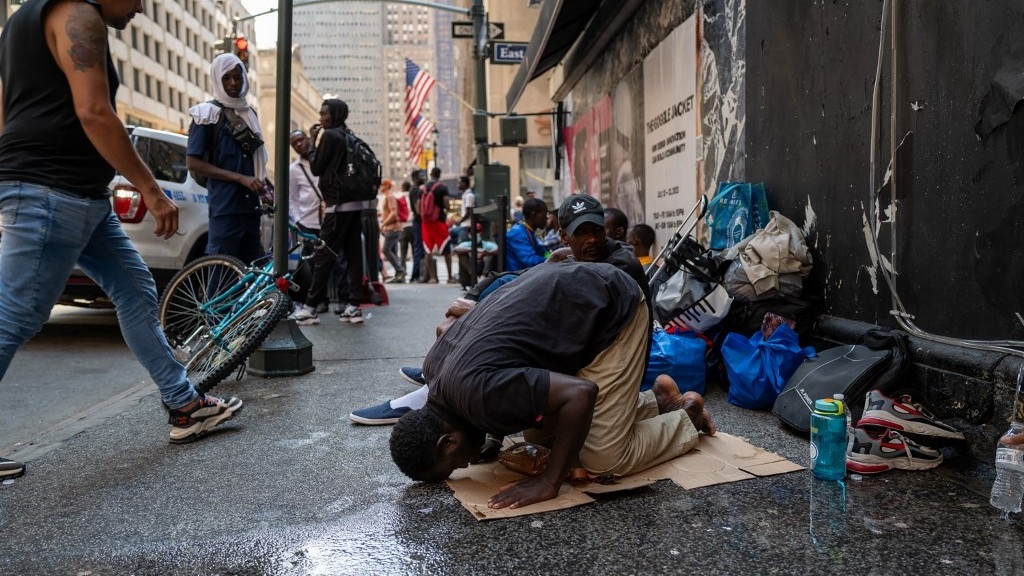
“Fa inna ma'al usri yusra.”
"Surely with hardship comes ease" is a verse from the Quran that Ibrahim constantly repeats in his heart.
Ibrahim's* one-month journey to America was nothing short of dangerous. He fled Conakry, Guinea, the only home he had ever known. Leaving his loved ones behind, he crossed nearly ten countries to make his way to the US, where he had nothing waiting but the hope of gaining asylum.
Ibrahim was put in jail twice during his journey. He was mugged and lost all his money. He travelled hundreds of miles by road to join the thousands of migrants who had escaped their home countries to enter the US for better lives.
Since March, Ibrahim has taken refuge at the Muslim Community Center (MCC) in Brooklyn, New York, along with other migrants and asylum seekers. He sleeps on a bed surrounded by 19 other beds all occupied by men who took a similar path.
New MEE newsletter: Jerusalem Dispatch
Sign up to get the latest insights and analysis on Israel-Palestine, alongside Turkey Unpacked and other MEE newsletters
Both the terms "migrant" and "asylum seeker" refer to individuals who leave their home countries. The word "migrant" is a broad term, while "asylum seeker" refers specifically to someone seeking protection and who has filed an application for asylum. While all asylum seekers are migrants, not all migrants are asylum seekers.
“Alhamdulillah,” praise be to God, he says. Despite the difficulties he has gone through, he makes sure not to lose hope.
Guinea, a West African country and a former French colony that borders Mali, has a deep-rooted tradition of aiding those fleeing persecution. In 1999, Guinea stood out as Africa's leading haven for refugees, sheltering around 450,000 individuals. Although these numbers have decreased since then, Guinea remains a refugee sanctuary.
On 5 September 2021, Guinea’s ruling junta, known as the National Committee of Reconciliation and Development (CNRD), toppled President Alpha Conde, the nation's democratically elected leader, by a military coup. Since then, Guinea’s military government has been clamping down on pro-democracy protests with alarming violence leading to a number of deaths.
The ruling authority cautioned that any additional opposition would face the full force of the military.
In Guinea's population of about 13.4 million, nearly 55 percent of people live in poverty. The turmoil and lack of food security are some of the driving factors behind people's efforts to flee Guinea - people like Ibrahim.
“Taking a decision to leave your country, to leave your family, your friends, those who you know since childhood, the place that you love, the people you love, to leave them… it’s something very difficult,” Ibrahim told Middle East Eye, sitting on a prayer mat at the MCC.
“But as a man, this was a choice I had to make,” Ibrahim said in heavily accented English, a language he studied in Guinea.
He chuckled when reminiscing about the food he missed. He teared up when talking about his little boys, whom he desperately wanted to hold in his arms again, and shook his head when he spoke of his long journey.
Ibrahim’s voyage began in February 2023, when he went to his neighbouring country of Senegal and took a flight to Turkey. From there, he went to Bogota, Colombia. Then to Panama, and then to Nicaragua. From there on, he went to Honduras, then Guatemala, and then Mexico travelling both by car and and on foot.
Ibrahim speaks French, but when officers would pull him over in this primarily Spanish-speaking continent, it was a communication dead end.
In Mexico, he was robbed. He didn’t know what to do. He didn’t want to give up. So he asked his father for help, who obliged and wired him money.
“I didn’t even have anything to eat, but as a father, I continued my journey,” he recalled. In Mexico, he was put in jail and his money confiscated - for reasons he still doesn’t understand. But he was too shy to ask his father for help again.
“I had to be courageous and keep going.”
Ibrahim grew up with the notion that American streets were paved with gold, and television played no small part in that belief. But when he got to California, it was nothing like the dream he had been fed. Ibrahim couldn’t even find a place to stay.
“It’s not easy going someplace you don’t know. People aren’t ready to accommodate you. I reached out to a friend and said I’d stay in a hotel for a few days. But I was all alone and it was not easy,” he said.
A friend then told him about MCC on the country's opposite coast. He was told that other people like him stayed there. So, he took one final journey from California to New York by bus, and since March, that is where he can be found.
“MCC saw us as humans. They treated us like humans. They gave us a place to stay,” Ibrahim said. This was the first time in his month-long perilous journey that he found a semblance of peace and was treated humanely.
Muslim Community Center
When Soniya Ali was five years old, she and her family left their homeland of Kashmir. Like many people before her, the journey was not easy. Today, she serves as the executive director of MCC and works with migrants who have left their own homelands.
MCC has always been more than just a space for worship. It offered women a place to stay when they were escaping abusive homes, and it eventually helped to found the Asiyah Women’s Center. It’s the headquarters of Muslims Giving Back, a non-profit organisation that donates food to the needy every weekend. And it helped found Janazah Community Services, a funeral home that offers free services. All of them are based in New York City.
A year ago Ali got a call from a woman by the name of Adama Bah asking her one question: "Do you have room?" After being told about the migrant crisis in New York and how there was a mosque in the Bronx called Masjid Ansaru-Deen that has been housing migrants since 2020 but was at capacity, Ali answered, "Yes".
In the beginning, the migrants and asylum seekers slept in the main prayer area. Eventually, they moved upstairs where there were beds, some couches, and a small kitchen.
At the MCC, migrants ranging from ages 19 to 50 come from everywhere including Senegal, Guinea, Venezuela, Mauritania, Turkey, and Syria.
While many of them are Muslim, MCC doesn’t turn away non-Muslims. Since last year, there have been anywhere from around 75 to 100 migrants that have called MCC home. Whether it is for a day or a few months, they leave when they are ready.
Migrants are offered English classes and are given assistance in applying for NYC ID cards and securing health insurance. They are also provided with MetroCards for public transit, and food and shelter.
“As Muslims, we are taught to love for our brother what we love for ourselves. If somebody was sent to you, there's a reason they were sent to you,” Ali said.
“Our community being in this position where we have people coming in that need our help, I think we're blessed. And I hope that we can see that and understand that we're a vessel to help our brothers and sisters.”
Ali says this work has taught her compassion, but it has shown her that not everyone takes care of others because if they did, “we wouldn’t be going through this crisis,” she said, referring to what many are calling a "migrant crisis" in the US.
Since the spring of 2022, New York has seen an influx of more than 90,000 migrants and asylum-seekers. Each night, an average of 57,000 people are being cared for by the city. New York City Mayor Eric Adams says the city is at full capacity.
Hundreds of migrants sleep shoulder to shoulder on the sidewalk outside the Roosevelt Hotel in Midtown Manhattan for days, hoping the city will eventually help them. The Roosevelt Hotel serves as an initial processing point for individuals before they are dispatched to various shelters across the city. However, these shelters now report being full.
In July, Adams announced that New York City would begin discouraging asylum seekers from seeking refuge there, distributing fliers at the southern border and warning migrants there is “no guarantee” they will receive shelter or services as there is “no more room in the city”, The New York Times reported.
In August, the city requested permission from the state to distribute 60-day time limit notices to adult asylum seekers residing in Department of Homeless Services (DHS) shelters. This move aims to create space for families with children, who the city says presently constitute many asylum seekers under DHS care.
The thing is though, New York City has long held its status as a "sanctuary city", a place that guarantees a right to shelter for everyone.
So where is the sanctuary, advocates argue?
“We’re supposed to be a sanctuary city, but we’re not,” Bah said.
The crisis
Bah is an immigrant rights activist. She emigrated from Conakry, like Ibrahim, but she was just a child. In 2005, when she was just 17 years old, FBI agents arrested Bah and her father.
Bah spent weeks in a detention centre being questioned under the suspicion of terrorism. At the time, a confidential government report leaked to the media alleged that Bah could be a threat to national security, yet it lacked substantial evidence to back this assertion.
While her father was deported back to Guinea, she was released after six weeks in detention and was forced to live under partial house arrest with an ankle bracelet, a government-enforced curfew, and a court-issued gag order prohibiting her from speaking about her case.
Now, she spends her days advocating for the rights of migrants who just want a safe place to stay.
“I suffered a lot. And I knew these asylum seekers would come in, they would suffer, too, because the system wasn't created for me. And it was not going to be created for them.”
Bah is one of the first people to greet asylum seekers and migrants at their point of entry, whether it's at an airport or bus terminal. She and her team will meet them and refer them to a place to stay depending on what they need.
She explained that people from so many ethnic groups come in speaking so many languages.
“We’re not prepared for them. Specifically, the city isn’t prepared for them. People are coming from all walks of life, all religions, faiths, and genders. And the city is not prepared.”
In June, Adams announced that houses of worship - which include churches, synagogues and mosques - would provide shelter for nearly 1,000 migrants as part of a new plan.
The two-year agreement with New York Disaster Interfaith Services, which is comprised of faith-driven volunteers, aims to engage up to 50 religious institutions equipped with showers, dining facilities, storage areas for beds, and other essential facilities for overnight accommodations.
In August this year, Adams called the federal government for help. He, like his Republican counterparts, called on President Joe Biden to declare a state of emergency over asylum seekers, saying that it would cost New York $12bn in the upcoming years.
Migrants have been arriving in the US in huge numbers, especially since the end of the Covid-19 restrictions.
In May, the Biden administration announced they would be denying asylum to migrants who arrive at the US-Mexico border without first applying online or seeking protection in a country they passed through.
Despite facing extreme heat and the treacherous Arizona desert, there's been a significant surge in migrants illegally crossing the southern border, especially after it dropped to a two-year low in June, CBS News reported.
Recent figures indicate that border patrol agents in the Tucson sector, encompassing the majority of Arizona's border with Mexico and sections of the Sonoran Desert, have reported migrant numbers skyrocketing to about 1,900 per day. This marks a 134 percent rise from the June average of 812.
It's not just a crisis in the US. People are fleeing to any country that can protect them. In June, the European Union said it may loan Tunisia over $1bn to help develop its battered economy, rescue state finances and deal with a migration crisis, with most of the funds contingent on it agreeing to painful economic reforms.
In March, MEE reported on a surge of Egyptians fleeing their country via smuggling routes, into the war-torn streets of Libya and across the Central Mediterranean.
Some migrants are dying in the process. Since 2014, there have been over 28,021 missing migrants recorded in the Mediterranean. The Mediterranean Sea has become a site of escalating numbers of migrant fatalities. According to the Missing Migrants Project, it is likely that many deaths remain unrecorded.
Back in New York City, Bah believes something needs to be done.
“Our city did not want to prepare for this crisis. We had to be adamant. The city never wanted to have [migrants] or welcome them,” Bah said.
“When you don't want to welcome somebody, you won't make space. You won't allow them to be accepted in the society. And that's exactly what [Adams] did. He made it so that it was hard for them to be placed in a shelter.”
While there are many advocates for migrants, there are plenty who don’t want them in the US. Many people argue that migrants are eating away at resources. But that, according to Bah, is simply not true.
“Asylum seekers don’t qualify for any benefits. Everything that we have right now for them is something that was created specifically for them because of this crisis.”
A never-ending cycle
Ibrahim left behind his family. He has two sons - a six-year-old and a three-year-old. He says there are no words to describe how he misses them.
“If there was a possibility to see them even today, wallah (I swear to God) I will do it,” he said with sadness. “I miss them a lot.”
He also misses his country’s food. It takes him an hour and a half to get to a restaurant that serves West African food that reminds him of home.
Ibrahim recognises it is important for him to be in the US. He wants to continue his studies in agricultural science and feel protected, but he also wants to protect his family and give them a better life.
Leaving their families is something many migrants sacrifice when they make the dangerous journey to the US, Ibrahim says. It's what they tell Bah when she greets them as they exit their buses. And this is the message she conveys to anyone who listens on the other side of her phone, as she pleads with them to make space for people who just want a better life.
When Ali welcomes people into her mosque, she tells them it’ll be ok. And she does it for the next person, and the next person, and the next person. Ten thousand migrants a month - a cycle with no end in sight.
*Name has been changed to protect the identity of the person.
Middle East Eye delivers independent and unrivalled coverage and analysis of the Middle East, North Africa and beyond. To learn more about republishing this content and the associated fees, please fill out this form. More about MEE can be found here.


